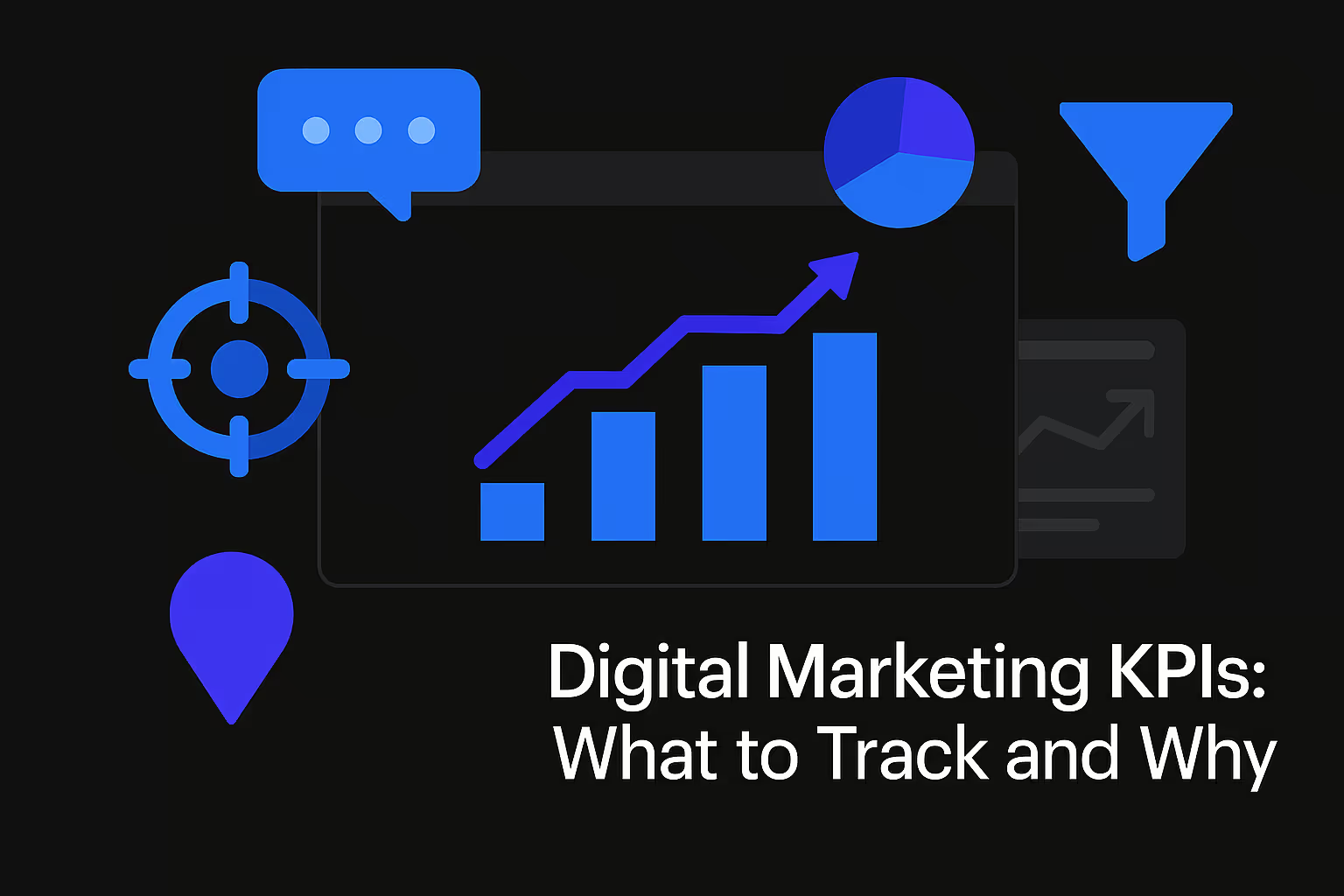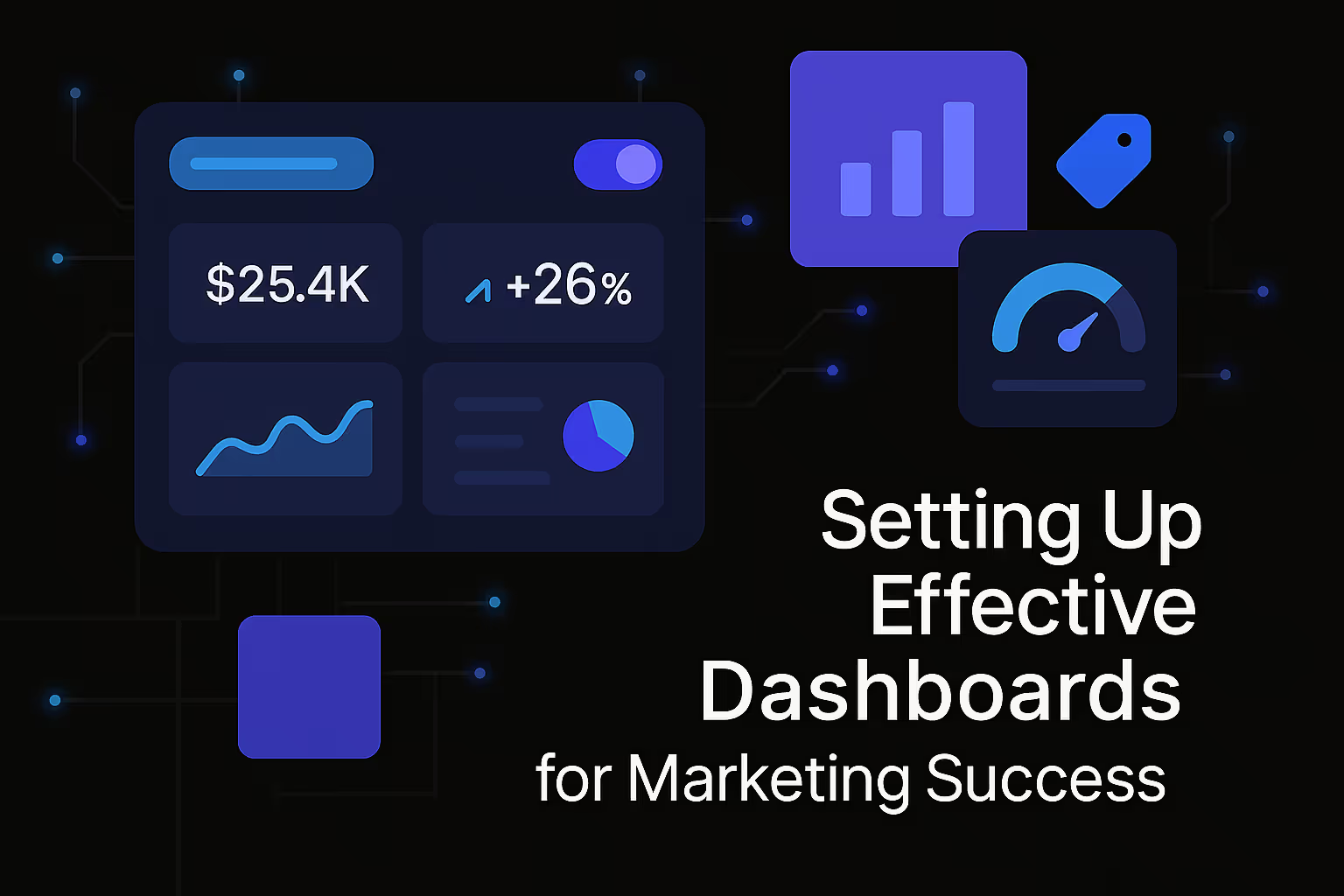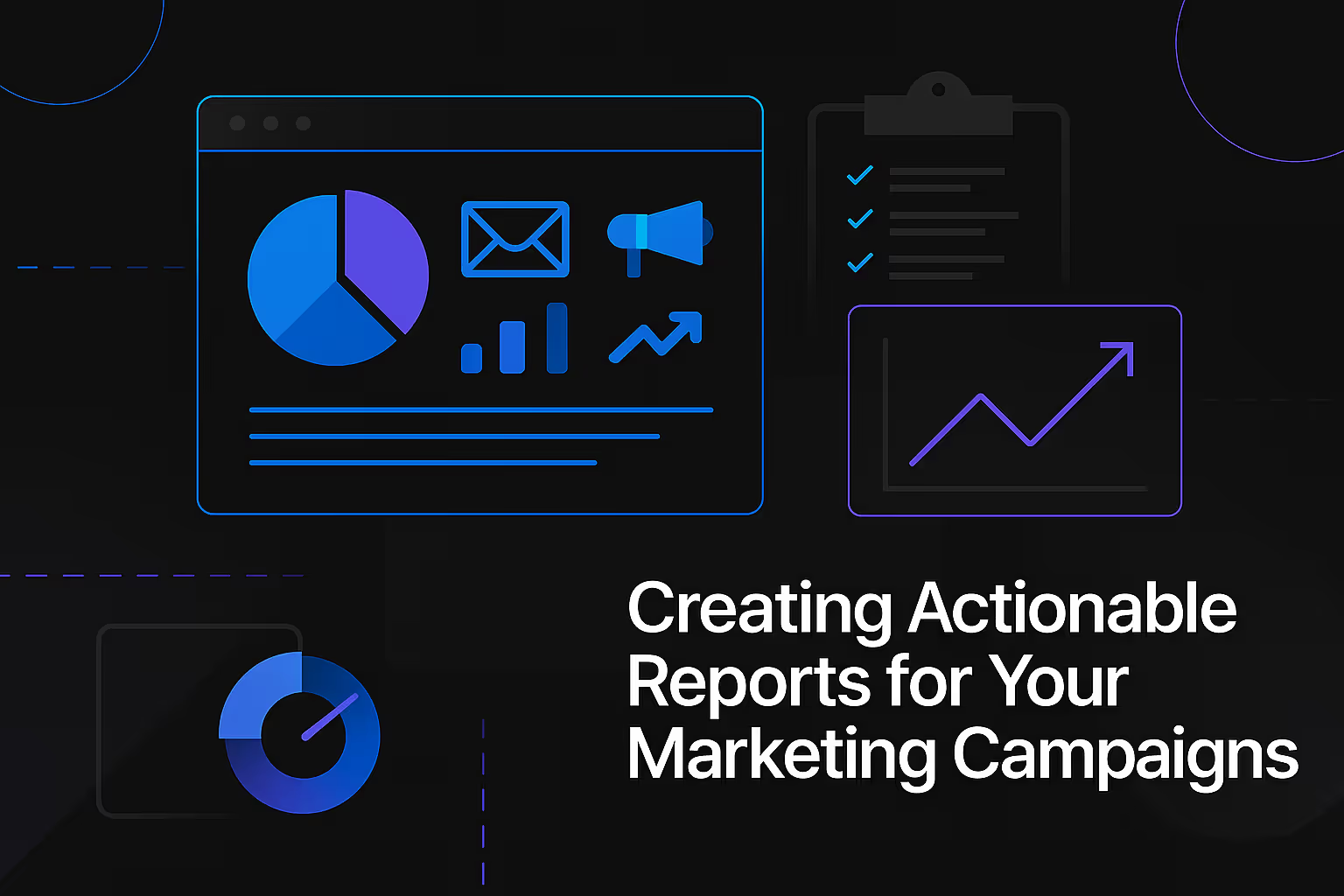Digital Marketing KPIs: What to Track and Why

In the dynamic landscape of modern business, digital marketing stands as a critical pillar for growth and engagement. However, the sheer volume of data and myriad strategies can often feel overwhelming, leading to uncertainty about what truly contributes to success. This is where Key Performance Indicators, or KPIs, emerge as the indispensable compass, guiding marketers through the complexities and revealing the true impact of their efforts. KPIs are not merely numbers; they are powerful insights, quantifiable metrics that reflect the health and effectiveness of your digital marketing initiatives, providing a clear pathway to informed decision-making and continuous improvement.
Understanding and meticulously tracking the right digital marketing KPIs is paramount for any business aiming to thrive online. Without a clear set of metrics, marketing activities risk becoming a shot in the dark, yielding unmeasurable results and inefficient resource allocation. By focusing on specific, measurable, achievable, relevant, and time-bound (SMART) KPIs, organizations can accurately assess their performance, identify areas for optimization, demonstrate return on investment (ROI), and ultimately, achieve their overarching business objectives. This comprehensive guide will delve into the most crucial digital marketing KPIs across various channels, explaining what they are, why they matter, and how tracking them can empower your strategic direction. Our exploration goes beyond just listing metrics; it aims to foster a deeper understanding of how these indicators connect to user behavior, business goals, and overall digital presence.
The Foundational Role of KPIs in Digital Marketing Strategy
At its core, digital marketing is about connecting with an audience, building relationships, and driving desired actions. KPIs serve as the quantifiable evidence of how effectively these connections are being made and how efficiently resources are being utilized. They transform abstract goals into tangible targets, allowing for a data-driven approach that is essential in today's competitive environment. Without a robust framework of KPIs, marketers operate on assumptions, leading to wasted budget and missed opportunities.
One of the primary reasons KPIs are so critical is their ability to provide clarity on performance. They answer fundamental questions: Is our website attracting the right audience? Are our social media efforts generating engagement? Is our email marketing converting subscribers into customers? These insights enable marketers to move beyond intuition and rely on concrete data to validate their strategies or pivot when necessary. Furthermore, KPIs facilitate accountability, allowing teams to track progress against established benchmarks and demonstrate value to stakeholders. When campaigns are tied to specific, measurable outcomes, it becomes easier to justify investments and secure future budget allocations. The strategic use of KPIs fosters a culture of continuous optimization, where every campaign, every piece of content, and every interaction is viewed through the lens of its measurable impact on business objectives. This iterative process of tracking, analyzing, and adapting is the hallmark of high-performing digital marketing.
Website Performance KPIs: The Hub of Your Digital Presence
Your website often serves as the central hub of your digital marketing efforts, the destination where prospects convert into leads and customers. Consequently, a deep understanding of website performance through specific KPIs is non-negotiable. These metrics offer invaluable insights into user behavior, content effectiveness, and the overall user experience.
Traffic Volume and Sources
Understanding traffic volume is the starting point. This metric indicates the total number of visits your website receives over a given period. While high traffic is often desirable, its true value lies in conjunction with other metrics. More important than the sheer number of visits is understanding traffic sources. This KPI breaks down where your visitors are coming from: organic search, direct traffic, referral sites, social media, or paid campaigns. Knowing your traffic sources helps identify which channels are most effective in driving visitors to your site and where to allocate future resources. For instance, a surge in organic traffic might indicate strong SEO performance, while a dip could signal a need to revisit keyword strategies or technical site health. Analyzing source data helps attribute success to specific marketing initiatives and optimize campaigns for maximum reach.
User Engagement Metrics
Once visitors arrive, their engagement becomes paramount. Key engagement KPIs include bounce rate, pages per session, and average session duration. Bounce rate measures the percentage of single-page sessions, where a user leaves your site from the entry page without interacting further. A high bounce rate can indicate several issues, such as irrelevant traffic, poor content quality, slow loading times, or a confusing user interface. Conversely, a low bounce rate often suggests that users are finding what they are looking for and are compelled to explore further.
Pages per session indicates how many pages a user views during a single visit. A higher number suggests deeper engagement and interest in your content. Similarly, average session duration measures the average amount of time users spend on your site. Longer durations typically correlate with higher engagement and content relevance. Together, these metrics paint a picture of how visitors interact with your website content. If users are spending considerable time exploring multiple pages, it suggests your content is resonating and effectively guiding them through their journey. Optimizing for these engagement metrics often involves improving content quality, enhancing site navigation, and ensuring a seamless user experience.
Conversion Rates
Ultimately, the goal of many website activities is conversion. This KPI measures the percentage of website visitors who complete a desired action, such as filling out a form, making a purchase, subscribing to a newsletter, or downloading a resource. Conversion rate is arguably one of the most important website KPIs as it directly reflects the effectiveness of your calls to action, landing page design, and overall value proposition. A low conversion rate, despite high traffic, suggests a disconnect between visitor intent and your site's ability to fulfill that intent. Tracking conversion rates for different goals allows for precise optimization, enabling A/B testing of headlines, button placement, copy, and visual elements to continually improve performance. Understanding the conversion funnel, from initial visit to final action, also allows for identifying drop-off points and implementing targeted interventions to guide users more effectively toward conversion.
Search Engine Optimization (SEO) KPIs: Building Organic Visibility
SEO is the cornerstone of long-term digital marketing success, focusing on improving your website's visibility in organic search engine results. Effective SEO attracts highly qualified traffic—users actively searching for information, products, or services you offer. Tracking specific SEO KPIs is crucial for understanding the impact of your optimization efforts and adapting to the ever-evolving search algorithms.
Organic Traffic and Keyword Rankings
The most direct SEO KPI is organic traffic, which quantifies the number of visitors arriving at your site from unpaid search engine results. A consistent increase in organic traffic is a strong indicator of successful SEO strategies. Complementing this is keyword rankings, which track your website's position in search results for specific target keywords. Improving rankings for high-intent keywords directly translates to increased visibility and, consequently, more organic traffic. Monitoring these rankings helps gauge the effectiveness of your keyword research, content optimization, and link-building efforts. A decline in rankings for critical keywords might necessitate a content refresh, a technical SEO audit, or a deeper dive into competitor strategies. The goal is not just to rank, but to rank for keywords that align with user intent and drive valuable traffic.
Click-Through Rate (CTR) and Impressions
Beyond rankings, Click-Through Rate (CTR) for organic listings provides insight into how appealing your search snippets are to users. CTR measures the percentage of users who click on your listing after seeing it in search results (impressions). A high CTR indicates that your title tags, meta descriptions, and rich snippets are compelling and accurately reflect the content of your page, encouraging users to click. Even if you rank highly, a low CTR suggests your snippet isn't enticing enough, and optimization is needed.
Impressions count how many times your website's link was displayed to a user in search results, regardless of whether they clicked on it. While impressions don't directly translate to traffic, they indicate your content's visibility for relevant queries. A high number of impressions coupled with a low CTR points to a need for improving your meta descriptions and titles to better entice clicks. Conversely, low impressions might suggest a need for more comprehensive keyword targeting or improved content authority. Analyzing these two KPIs together offers a nuanced view of your organic search performance, highlighting opportunities for both broader visibility and increased engagement with your search listings.
Backlinks and Domain Authority
Backlinks, or inbound links from other websites to yours, remain a critical SEO ranking factor. The quantity and quality of backlinks indicate your website's authority and trustworthiness to search engines. Tracking the number of backlinks, the domains linking to you, and their respective domain authorities provides a measure of your off-page SEO efforts. An increase in high-quality backlinks signals growing authority, which positively impacts search rankings.
Related to backlinks is Domain Authority (DA) or similar proprietary metrics that estimate a website's overall strength and relevance in a specific subject area. While not a direct Google ranking factor, these metrics provide a useful benchmark for comparison against competitors and demonstrate the long-term impact of your SEO strategies. A rising DA typically correlates with improved organic visibility across a broader range of keywords. Monitoring these technical and authority-focused KPIs ensures your site is not only optimized for content but also perceived as a credible and authoritative source by search engines.
Social Media Marketing KPIs: Cultivating Community and Engagement
Social media platforms are vibrant ecosystems for brand building, community engagement, and direct customer interaction. Measuring the success of your social media marketing requires a different set of KPIs, focusing on audience growth, engagement levels, and ultimately, conversion attribution.
Audience Growth and Reach
The most fundamental social media KPI is audience growth, tracking the increase in your followers or subscribers over time. While a large audience doesn't automatically equate to success, it forms the foundation for broader reach. Reach refers to the total number of unique users who saw your content. This metric indicates the potential audience your posts are exposed to. Monitoring both organic reach (unpaid) and paid reach (through advertising) helps understand the effectiveness of your content distribution strategy and whether your messages are breaking through the noise. A declining organic reach might signal a need to experiment with new content formats or posting times, while strong paid reach indicates effective ad targeting.
Engagement Rate
Engagement rate is arguably the most crucial social media KPI. It measures how actively your audience interacts with your content, including likes, comments, shares, saves, and clicks. A high engagement rate indicates that your content resonates with your audience, sparking conversations and fostering a sense of community. This metric is far more valuable than follower count alone, as it reflects the quality of your audience and the relevance of your messaging. Different platforms may have slightly different ways of calculating engagement, but the principle remains the same: a higher percentage of interactions relative to reach or followers suggests a more impactful social media presence. Analyzing engagement rates for different content types helps identify what truly connects with your audience, informing future content creation and campaign planning.
Referral Traffic and Conversions
While social media is excellent for brand building and engagement, its ultimate value often lies in driving traffic and conversions back to your website or specific landing pages. Referral traffic from social media tracks the number of visitors who arrive at your site by clicking links on your social profiles or posts. This KPI directly links your social media efforts to website activity. Further, tracking conversions attributed to social media measures the number of desired actions (purchases, sign-ups, downloads) that originated from your social channels. This involves setting up proper tracking mechanisms, such as UTM parameters, to accurately attribute conversions. Demonstrating social media's impact on bottom-line business goals is vital for proving ROI and justifying continued investment in these platforms. Understanding which social platforms drive the most valuable traffic and conversions allows for strategic allocation of resources and tailoring content to specific platform strengths.
Email Marketing KPIs: Nurturing Leads and Driving Loyalty
Email marketing remains one of the most powerful and cost-effective digital marketing channels for nurturing leads, building customer relationships, and driving repeat business. The intimate nature of email allows for personalized communication, making a precise understanding of email KPIs essential for optimizing campaigns.
Open Rate and Click-Through Rate (CTR)
The initial hurdle in email marketing is getting recipients to open your emails. Open rate measures the percentage of recipients who open your email. A low open rate can indicate issues with your subject lines, sender name, send time, or list quality. Optimizing subject lines for clarity, intrigue, and relevance is crucial for improving this metric. Once opened, the next step is getting recipients to engage with your content. Click-Through Rate (CTR) for email marketing measures the percentage of recipients who clicked on a link within your email. A high CTR suggests that your email content is compelling, relevant, and effectively guides users towards a desired action. Analyzing both open rates and CTR together provides a comprehensive view of how well your emails are performing, from initial impression to active engagement. A high open rate with a low CTR might mean your subject line is engaging but your content fails to deliver on its promise.
Conversion Rate and Unsubscribe Rate
The ultimate measure of email marketing success is its conversion rate, which tracks the percentage of email recipients who complete a desired action after clicking a link in your email, such as making a purchase, signing up for a webinar, or downloading an asset. This KPI directly reflects the effectiveness of your email campaigns in driving business outcomes. Monitoring conversion rates by campaign, segment, and call-to-action allows for continuous refinement and optimization of your email strategy.
Equally important is the unsubscribe rate, which measures the percentage of recipients who opt out of your email list after a particular campaign. While some unsubscribes are inevitable, a consistently high unsubscribe rate can signal problems with your content relevance, email frequency, or targeting. It might indicate that your audience is not finding value in your communications, prompting a need to re-evaluate your segmentation strategies, content themes, or overall email strategy. Balancing engagement and conversion with a healthy unsubscribe rate is key to maintaining a valuable and responsive email list over the long term.
Paid Advertising KPIs: Maximizing Ad Spend Efficiency
Paid advertising, encompassing channels like search engine marketing (SEM), social media ads, and display advertising, offers immediate visibility and precise targeting. However, it requires careful management and meticulous tracking of KPIs to ensure optimal ad spend efficiency and positive ROI.
Cost Per Click (CPC) and Click-Through Rate (CTR)
In paid search and display campaigns, Cost Per Click (CPC) is a fundamental KPI, representing the average cost you pay for each click on your ad. A lower CPC means you're getting more clicks for your budget. Factors influencing CPC include keyword competition, ad quality score, and bid strategy. Closely related is Click-Through Rate (CTR), which measures the percentage of users who click on your ad after seeing it. A high CTR indicates that your ad copy, headlines, and visuals are compelling and relevant to the target audience, leading to a better quality score and often a lower CPC. Optimizing both CTR and CPC is crucial for maximizing the reach and efficiency of your paid campaigns. A low CTR for a high-cost keyword, for instance, signals a need to revise ad copy or refine targeting.
Cost Per Acquisition (CPA) and Return on Ad Spend (ROAS)
While clicks and impressions are important, the true measure of paid advertising success lies in its ability to drive business outcomes. Cost Per Acquisition (CPA), also known as Cost Per Lead (CPL) or Cost Per Conversion, is a critical KPI that calculates the average cost to acquire a customer or a desired lead through your advertising efforts. A low CPA indicates efficient spending and a strong return on your advertising investment. Tracking CPA for different campaigns, keywords, and ad sets allows for precise budget allocation and identification of the most profitable advertising avenues.
Even more impactful is Return on Ad Spend (ROAS), which measures the revenue generated for every dollar spent on advertising. For example, a ROAS of 4:1 means you generated $4 in revenue for every $1 spent on ads. ROAS is a direct measure of profitability and helps determine the overall success and scalability of your paid advertising efforts. A high ROAS demonstrates a strong positive return, justifying increased investment. Continuously optimizing campaigns to reduce CPA and increase ROAS ensures that your paid advertising budget is working as hard as possible to generate tangible business value. These metrics go beyond mere clicks, focusing squarely on the financial impact of your advertising spend.
Beyond the Numbers: Interpreting and Acting on Your KPIs
Tracking KPIs is only half the battle; the true power lies in the ability to interpret the data and translate insights into actionable strategies. A holistic approach to KPI analysis involves looking beyond individual metrics and understanding the relationships between them, connecting the dots to paint a comprehensive picture of your digital marketing performance.
Contextualizing Data with Business Goals
Every KPI should be viewed within the context of your overarching business goals. For instance, if your primary goal is brand awareness, then impressions, reach, and engagement rates on social media might be your most important KPIs. If the goal is e-commerce sales, then conversion rates, ROAS, and average order value take precedence. Misaligning KPIs with business objectives can lead to focusing on vanity metrics that don't contribute to tangible growth. Before setting up tracking, clearly define what success looks like for your specific marketing objectives and then select the KPIs that most accurately reflect progress towards those goals. This ensures that every effort is purposefully directed and measurable against the desired outcome.
Identifying Trends and Anomalies
Rather than looking at KPIs in isolation or as one-off snapshots, it is vital to monitor them over time to identify trends. Are your website conversion rates steadily increasing week over week? Is your organic traffic showing consistent growth month over month? Trends reveal the long-term impact of your strategies and indicate whether your efforts are sustainable. Equally important is identifying anomalies – sudden spikes or drops in performance. A sudden dip in email open rates might indicate an issue with your email server or a flagging subject line. A sudden surge in referral traffic could point to a successful partnership or a piece of viral content. Investigating these anomalies quickly allows you to either capitalize on unexpected successes or mitigate potential problems before they escalate. Tools that provide historical data and visual dashboards are invaluable for this type of trend analysis.
Iterative Optimization and A/B Testing
The insights gained from KPI analysis should fuel a continuous cycle of iterative optimization. Digital marketing is not a "set it and forget it" endeavor; it requires constant refinement. If your landing page has a high bounce rate, use your KPI data to hypothesize why, then implement changes (e.g., clearer call to action, faster load time) and test them. This leads to the crucial practice of A/B testing, where different versions of an ad, a landing page, an email subject line, or a website element are tested against each other to see which performs better according to your defined KPIs. By systematically testing hypotheses and measuring the impact on relevant metrics, marketers can progressively improve campaign performance, driving higher engagement, better conversion rates, and ultimately, stronger ROI. This data-driven experimentation is what transforms raw numbers into strategic advantages, allowing for the consistent evolution and enhancement of your digital marketing ecosystem.
Attribution Modeling: Understanding the Customer Journey
In today's multi-channel digital environment, customers often interact with a brand across several touchpoints before converting. Attribution modeling is the process of assigning credit to different marketing channels that contribute to a conversion. Without proper attribution, it can be challenging to understand which channels are truly driving value and where to allocate budget most effectively. Different attribution models exist, such as first-click, last-click, linear, or time decay, each offering a different perspective on the customer journey.
For example, a last-click model gives all credit to the final touchpoint before conversion, which might undervalue channels that initiate the journey, like a social media ad. A linear model distributes credit equally across all touchpoints. Understanding and implementing an attribution model that aligns with your business objectives provides a more accurate view of channel performance and helps optimize your entire marketing funnel. This deeper understanding ensures that resources are allocated not just to the channels that close the deal, but also to those that effectively build awareness and nurture leads early in the customer journey. It moves beyond siloed channel performance to a comprehensive view of the interconnectedness of your digital marketing efforts.
Conclusion: The Path to Data-Driven Digital Marketing Excellence
Digital marketing KPIs are far more than just metrics; they are the strategic pulse of your online operations. They provide the necessary visibility to understand what is working, what isn't, and most importantly, why. By meticulously tracking, analyzing, and acting upon the right KPIs, businesses can transition from guesswork to data-driven certainty, making informed decisions that propel them towards their marketing and business objectives.
From understanding website traffic and user engagement to measuring the effectiveness of your SEO strategies, social media campaigns, email nurturing, and paid advertising efforts, each KPI offers a unique piece of the puzzle. The true mastery of digital marketing lies not just in collecting these numbers, but in interpreting their meaning, identifying trends, uncovering anomalies, and using these insights to foster a culture of continuous optimization. Embracing a robust KPI framework empowers marketers to demonstrate ROI, allocate resources efficiently, adapt proactively to market shifts, and ultimately, build a resilient and successful digital presence that drives sustainable growth. The journey to digital marketing excellence is an ongoing process of measurement, learning, and strategic adaptation, with KPIs serving as the unwavering guide.
Similar Insights
Stay Updated with Our Insights
Join our newsletter for the latest trends and tips in web development and digital marketing.




